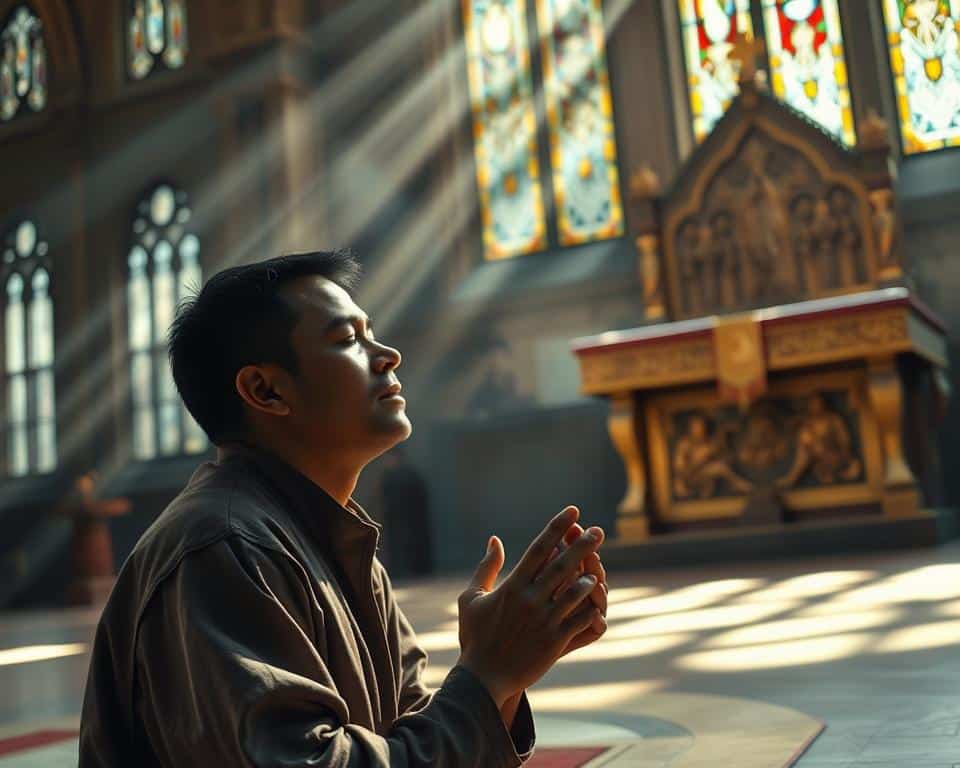Martin Luther King Jr. once said, “Faith is taking the first step even when you don’t see the whole staircase.” This powerful truth reminds us that belief isn’t passive—it’s lived out through choices.
Scripture teaches that trust in God moves beyond words. James 2:17 makes it clear: faith without works is dead. When we encourage a friend, serve at church, or trust God during illness, we put belief into practice.
For Seventh-day Adventists, this means following Christ’s example daily. Small acts, like sending a hopeful text or helping a neighbor, reflect our relationship with Him. Even struggles, such as chronic pain, become opportunities to rely on God’s strength.
This article explores how to live out Biblically-rooted trust. Let’s discover practical ways to make faith visible in every moment.
What Is Faith in Action?
True belief isn’t just knowing—it’s doing. Scripture compares faith without deeds to a body without breath (James 2:17). When we obey God’s word, trust moves from our minds to our actions.

Defining Faith Beyond Belief
Intellectual belief isn’t enough. James 1:22 warns against hearing truth without living it. A friend with Crohn’s disease showed me this: though pain limited her, she prayed, “God, use this for Your purpose.” Her surrender was faith in motion.
Like the early church sharing possessions (Acts 2:44–45), deeds validate belief. Love for neighbors isn’t a feeling—it’s meals delivered, prayers spoken, and time given.
The Connection Between Faith and Deeds
Prayer is more than wishes; it’s active trust. When Jesus said, “Love your neighbor”, He called for hands-on compassion. My friend’s prayer wasn’t passive—it fueled her service despite illness.
Faith grows when we step out. Whether helping a stranger or trusting God in hardship, actions prove what our hearts believe.
Practical Examples of Faith in Action
Everyday moments become sacred when we choose to serve. Scripture reminds us that love isn’t theoretical—it’s lived out through tangible deeds. Here’s how real people embody trust in God.

Sharing Personal Testimonies
Christine’s blog turned her struggle into hope. Diagnosed with a brain tumor, she wrote, “Praise the Lord even here.” Her posts now guide others facing trials, proving words can be action.
Serving Others in Need
My neighbor’s arthritis limits her mobility, but she still delivers groceries to seniors. Another friend cooks meals for new parents. These small actions reflect Christ’s command to love others.
Trusting God in Difficult Times
When a family member fell ill, we rallied in prayer. Like the early church, we saw God’s faithfulness through shared burdens. Even chronic pain becomes a platform to worship God in trials.
Biblical Foundations for Faith in Action
James and Acts reveal how trust in God transforms into tangible deeds. These Scriptures don’t just describe belief—they show us how to live it.
Faith Without Works Is Dead
James 2:17 makes it plain: “Faith by itself isn’t enough. Unless it produces good deeds, it is dead and useless” (CEV). The ESV sharpens this: faith without works is dead. Belief isn’t real until it changes how we act.
Like a tree without fruit, faith without action lacks life. When we serve others or trust God in trials, we prove our belief is alive.
The Early Church’s Blueprint
Acts 2:42–47 paints a vivid picture. The first believers devoted themselves to:
- Teaching—learning God’s Word together
- Fellowship—sharing meals and resources (Acts 2:45)
- Prayer—relying on God’s power daily
Their generosity wasn’t optional. They sold property to help those in need, showing trust in God’s promises over material security.
Luke notes their church grew because people saw God’s power in their unity (Acts 2:47). Miracles inspired awe, but daily love drew others to Christ.
“They broke bread in their homes and ate together with glad and sincere hearts.” —Acts 2:46
This wasn’t just communion—it was shared life. Today, we mirror this by serving meals, hosting small groups, or simply checking on a neighbor.
How to Live Out Faith Daily
Every sunrise offers new ways to reflect God’s love. Small, intentional steps build a life of trust—one where belief isn’t just spoken but shown. Here’s how to make each day count.
Small Acts of Kindness
Jesus modeled this in Mark 10:45: “Serve others, not yourself.” Start with these simple steps:
- Write encouraging notes—leave one in a coworker’s desk or a neighbor’s mailbox.
- Offer childcare for overwhelmed parents. Even an hour helps.
- Give rides to Bible study or appointments. Your car becomes a tool for love.
Prayer as a Form of Action
Prayer moves mountains—and our feet. Try these active approaches:
- 5-minute prayer walks: Pray for homes you pass. Ask, “How can I pray for you today?”
- Surrender struggles with the “I surrender all” prayer from James 4:7.
- Keep a gratitude journal as a family. Kids learn faith through thankfulness.
Encouraging Others with Words
Proverbs 16:24 says kind words are like honey. Use your voice to:
- Text Scripture to someone facing a hard day.
- Speak blessings over meals or meetings. Simple phrases like “God’s presence is here” shift atmospheres.
- Tithe generously. Giving firstfruits shows trust in God’s provision.
“Let your light shine before others, that they may see your good deeds and glorify God.” —Matthew 5:16
Whether it’s a meal shared or a prayer whispered, every act plants seeds of hope. Start today—your ordinary moments hold eternal value.
Overcoming Challenges to Faith in Action
Walking out faith isn’t always easy, especially when pain or doubt clouds our vision. Like a muscle, trust grows stronger when tested—but the process can feel overwhelming. Scripture doesn’t ignore these struggles; it meets us in them with raw honesty and hope.
Dealing with Doubt
A friend with Crohn’s disease once whispered, “I believe, Lord—help my unbelief!” (Mark 9:24). Her prayer mirrors ours when life feels too heavy. Doubt isn’t failure—it’s a checkpoint to deeper reliance on God.
Chronic pain reshapes how we serve. My neighbor, who uses a walker, now ministers through prayer calls instead of meal deliveries. Her limitations didn’t cancel her faith—they redirected it. Like Job, she asks hard questions but still declares, “The Lord gave, and the Lord has taken away; blessed be His name” (Job 1:21).
Persevering Through Hardships
On the hardest days, Psalm-based prayers anchor us. Try praying Psalm 61:2 aloud: “Lead me to the rock that is higher than I.” When chemotherapy left another friend exhausted, her church organized a meal train—a modern-day Acts 2:45 in action.
Organizations like Faith in Action International connect volunteers with homebound seniors, proving love finds a way. Whether through a casserole or a handwritten note, small acts carry God’s strength into broken places.
“But he said to me, ‘My grace is sufficient for you, for my power is made perfect in weakness.’” —2 Corinthians 12:9
Our struggles become platforms for God’s truth. When we admit our limits yet keep serving however we can, faith moves from theory to lived experience.
Inspiring Your Journey of Active Faith
Your journey of trust begins with one intentional step. Groups like Faith in New York (718-426-6564) and PICO California show how people unite to serve their communities. Start small—volunteer at a food bank or join a Bible study modeled after Acts 2:42.
Christine’s blog proves even stories can be acts of love. Choose one action from this article: text encouragement, give rides, or balance faith and works daily. Let James 2:17 remind you—belief thrives when lived out.
A friend often says, “God has this in His capable hands.” Your family, work, and world need that hope. Step forward today.





